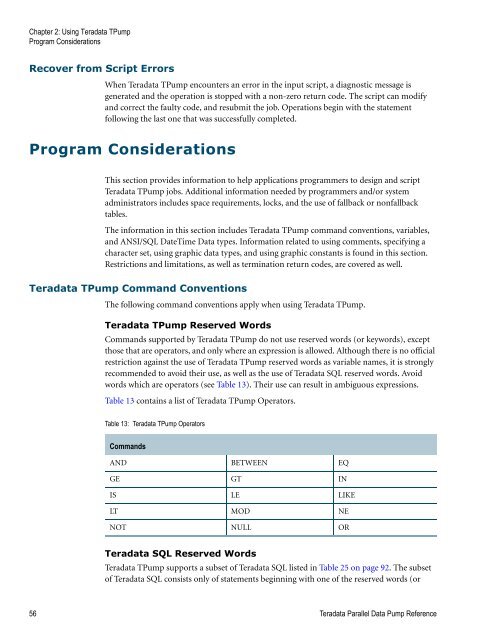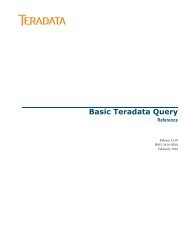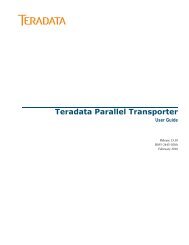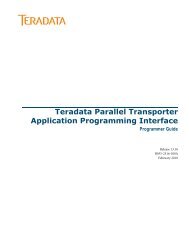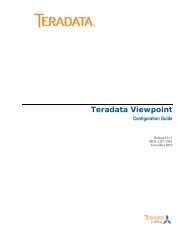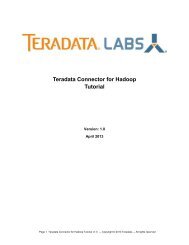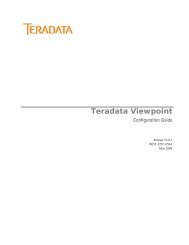Teradata Parallel Data Pump
Teradata Parallel Data Pump Reference - Teradata Developer ...
Teradata Parallel Data Pump Reference - Teradata Developer ...
- No tags were found...
Create successful ePaper yourself
Turn your PDF publications into a flip-book with our unique Google optimized e-Paper software.
Chapter 2: Using <strong>Teradata</strong> T<strong>Pump</strong><br />
Program Considerations<br />
Recover from Script Errors<br />
When <strong>Teradata</strong> T<strong>Pump</strong> encounters an error in the input script, a diagnostic message is<br />
generated and the operation is stopped with a non-zero return code. The script can modify<br />
and correct the faulty code, and resubmit the job. Operations begin with the statement<br />
following the last one that was successfully completed.<br />
Program Considerations<br />
This section provides information to help applications programmers to design and script<br />
<strong>Teradata</strong> T<strong>Pump</strong> jobs. Additional information needed by programmers and/or system<br />
administrators includes space requirements, locks, and the use of fallback or nonfallback<br />
tables.<br />
The information in this section includes <strong>Teradata</strong> T<strong>Pump</strong> command conventions, variables,<br />
and ANSI/SQL DateTime <strong>Data</strong> types. Information related to using comments, specifying a<br />
character set, using graphic data types, and using graphic constants is found in this section.<br />
Restrictions and limitations, as well as termination return codes, are covered as well.<br />
<strong>Teradata</strong> T<strong>Pump</strong> Command Conventions<br />
The following command conventions apply when using <strong>Teradata</strong> T<strong>Pump</strong>.<br />
<strong>Teradata</strong> T<strong>Pump</strong> Reserved Words<br />
Commands supported by <strong>Teradata</strong> T<strong>Pump</strong> do not use reserved words (or keywords), except<br />
those that are operators, and only where an expression is allowed. Although there is no official<br />
restriction against the use of <strong>Teradata</strong> T<strong>Pump</strong> reserved words as variable names, it is strongly<br />
recommended to avoid their use, as well as the use of <strong>Teradata</strong> SQL reserved words. Avoid<br />
words which are operators (see Table 13). Their use can result in ambiguous expressions.<br />
Table 13 contains a list of <strong>Teradata</strong> T<strong>Pump</strong> Operators.<br />
Table 13: <strong>Teradata</strong> T<strong>Pump</strong> Operators<br />
Commands<br />
AND BETWEEN EQ<br />
GE GT IN<br />
IS LE LIKE<br />
LT MOD NE<br />
NOT NULL OR<br />
<strong>Teradata</strong> SQL Reserved Words<br />
<strong>Teradata</strong> T<strong>Pump</strong> supports a subset of <strong>Teradata</strong> SQL listed in Table 25 on page 92. The subset<br />
of <strong>Teradata</strong> SQL consists only of statements beginning with one of the reserved words (or<br />
56 <strong>Teradata</strong> <strong>Parallel</strong> <strong>Data</strong> <strong>Pump</strong> Reference


